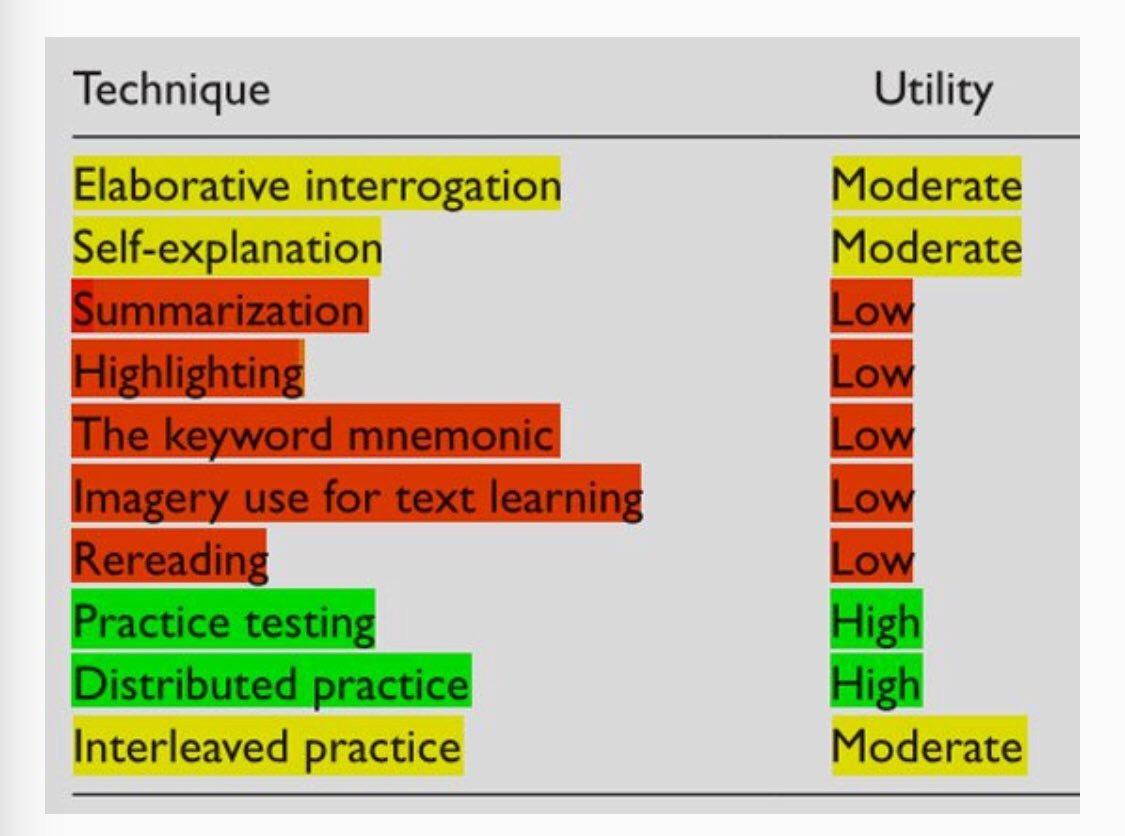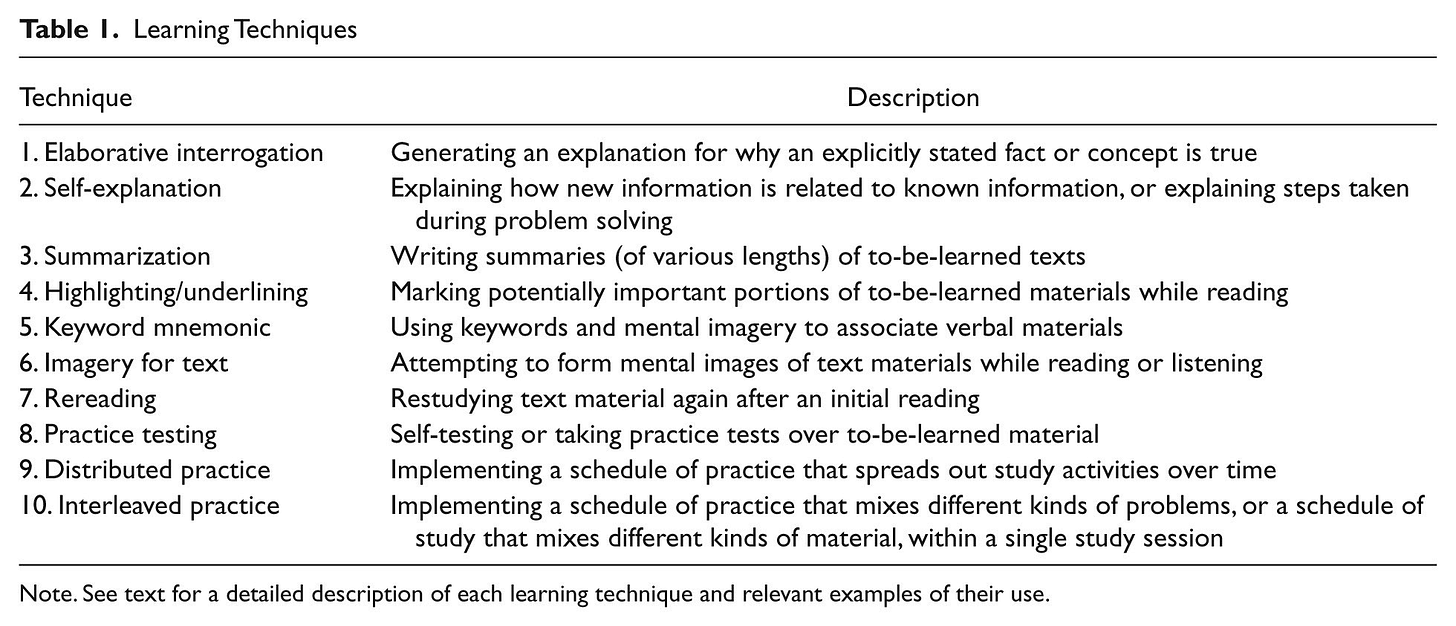Links to Consider, 4/15
The Zvi on raising kids these days; Richard Hanania on Substack Notes; Jeff Eggers on leadership; Glenn Loury on Clarence Thomas; Martin Gurri's Commencement Address
Study finds a lot of common learning techniques don’t work.
That sounds a lot like ‘if you want to learn X, practice X and test X.’
Typical Zvi substack post—long and information-dense.
At the other end of the usefulness spectrum, Richard Hanania has hopes for Substack Notes.
I’ve always dreamed of a Twitter with a minimum IQ requirement. Or, more importantly, a way to filter out the hateful and intellectually lazy; the stupid and curious are much more tolerable. With the rolling out of Notes, I hope that it’s finally here.
To me, Substack trying to imitate Twitter is like a gourmet chef opening up a fast-food franchise. All I can figure is that some big executive or financial backer of Substack is so consumed by Musk-hatred that he is willing to throw resources at this idea.
Dave Epstein interviews Jeff Eggers, who says,
One of [co-author Stanley McChrystal’s] other contextual questions was: Why is it that you can take a championship winning head coach out of one system, throw three times as much money at them, drop them into this college or that team, and their record is abysmal? What changed? Well, everything. The context changed.
I’ve never figured out Tyler Cowen’s aphorism about context being scarce, but I figure there is a tie-in somewhere. What I like about the interview is the way that Eggers mulls his answers. He doesn’t speak in Substack Notes Tweets.
Clarence Thomas is treated almost like a cartoon villain. … Why does Thomas’s conservatism nullify, in the eyes of so many African Americans, his astonishing accomplishments? Why is he treated—condescendingly, unfairly, wrongly—as a lapdog to white corporate and political interests, while Obama, who did little to mitigate the racial inequities he claimed to abhor, is lauded as the very embodiment of black uplift?
I think that one of the most powerful political hueristics is what David McRaney calls asymmetric insight. When you come across a political belief with which you disagree, your instinct is not to try to understand it and steel-man it. Instead, your instinct is to try to explain it as a personality flaw. If you did not dismiss Thomas as a lapdog, then in you might feel obliged to read a sympathetic biography or to comb through his body of work in order to be able to argue with him.
I should note that I asked ChatGPT-4 to describe Thomas’ motivations and beliefs. It concluded,
Overall, Justice Thomas's motivations and beliefs can be characterized as conservative, originalist, and strict constructionist. However, it is important to note that he is an independent thinker who has occasionally broken with conservative orthodoxy on certain issues.
Not a lapdog.
The average American spends more than seven hours a day online. Increasingly, that time is spent in solitude: actualizing has lost any social connection and is now a matter of admiring our digital selves.
He says that we have attained abundance but lost our sense of adventure. He derides those who view our social problem as one of scarcity,
a group that includes Ezra Klein, Noah Smith, and Marc Andreessen.
I do not think that Andreessen belong in that group. I think that the Moment of Zen crowd would agree with the “supply-side progressives” that regulation ought to be re-calibrated, but I think that they are at least as concerned as Gurri with the cultural loss of a spirit of adventure.
Gurri’s tone in the piece is inspirational, so I call it his Commencement Address.
Substacks referenced above:
@
@
@
@
@







On the Clarence Thomas front, it's a lot tougher for the left to accommodate his judicial views because it would not make any room for the way that the modern federal government works. I don't think it's necessarily correct to describe Thomas thought as "conservative" because if you had five Thomases on the Court, it would effect something like a revolution, at least domestically. See https://www.nytimes.com/2022/07/02/business/scotus-lochner-v-new-york.html
A lot of this controversy is more heat than light. The reality is that, internationally speaking, the revolution already happened. The post-New Deal era already died in the 1970s. The legal logic of the New Deal era was that interstate competition could be regulated and moderated through the Commerce Clause. Instead of a system that encouraged states to compete to keep wages & regulation down (Lochner era), the post-1937 legal philosophy was to limit interstate competition to keep wages up. The Larry Tribes of the world are trying to preserve a revolution that already died in the '70s.
The logic of the minimum wage and things like it is that Congress has the right to regulate interstate traffic of goods that were manufactured in factories etc. that did not observe federal minimum wage, safety laws etc. etc..
I go to Walmart today. I look at the shelves. Every single f*cking thing on the shelves barring some exceptions was not manufactured according to the legal logic of the New Deal era. Go to the clothing section. Like every t-shirt and yoga pant was made in Vietnam by workers earning $2 an hour and working 12 hour shifts. The New Deal logic says that every unit in that store should be seized by the feds, if it were made domestically under such conditions. It was manufactured overseas by producers who ignore those legal standards, so it does not get seized by the feds. How does this make sense? The magic of looking-the-other-way liberalism.
So, what I'm trying to get at here is that the liberals are in fact the conservatives of a legal system that has already been made ridiculous and antiquated by neoliberalism, which is a practical philosophy that says in effect that we should ignore many of our domestic economic regulations while pretending that they are still good because getting rid of them conventionally is politically impossible. Returning to the Lochner era or something like it, which is what Thomas is reaching towards, would be a recognition that the New Deal is in fact dead and has been dead for more than 50 years. Our reactionary liberal philosophers, tinged with Michael Moore type nostalgia, want to pretend really hard that their system is not dead and has not been dead for many decades now. Fortunately for them, moderates on the court are fine with this and don't want to upset the moronic apple cart.
That sounds a lot like ‘if you want to learn X, practice X and test X. I am using ChatGPT to generate tests in Spanish and they are quite good. In addition ChatGPT is quite good at producing scheduled curriculums. So, it can help you define your learning schedule, set goals and test. Nirvana.